Chapter Seven – the seventh letter
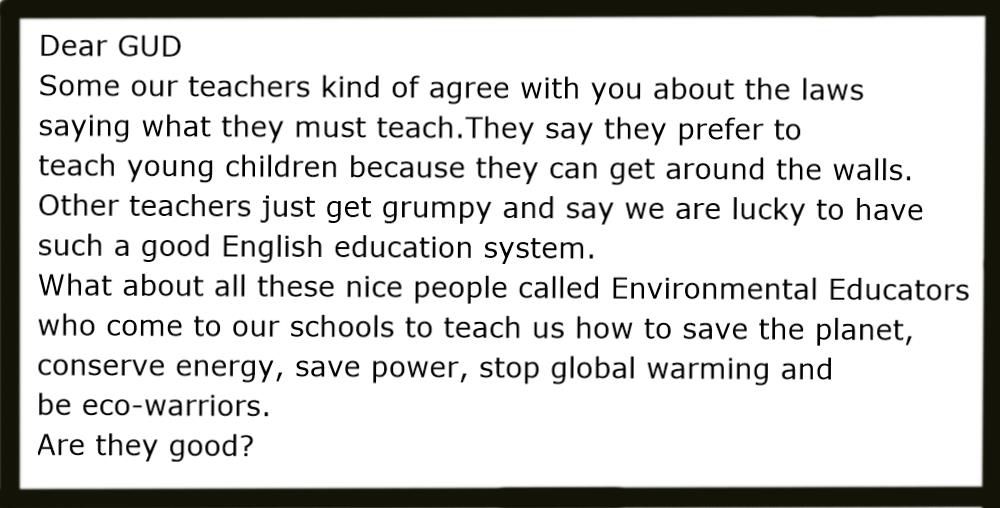
⇓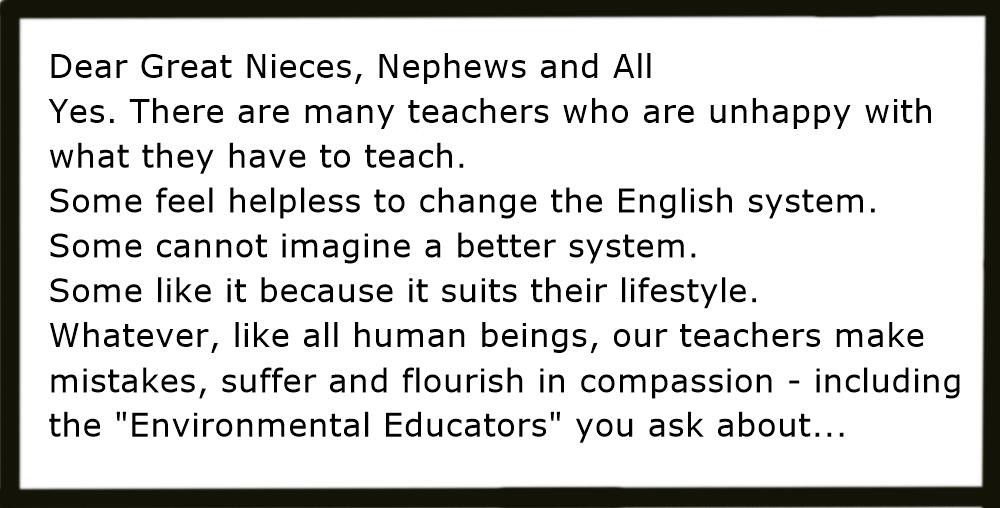
⇓ One
Part of me, maybe the compassionate part, has great difficulty answering your question, “Are Environmental Educators good?” It responds with more questions, lots more questions:
Can nice, kind and well-intentioned people make mistakes?
What if their lifestyle is unsustainable – how will this be reflected in their use of language?
What if their use of language is unsustainable – how will this alter people’s behaviour, including their own lifestyle?
What is an “Environmental Educator”?
Indeed, what is “the environment”?
How might the ego and compassion be expressed in the word?
What is the physics (paradox) of the word?
Maybe we should check back through our letters for insights that might help us answer your question…
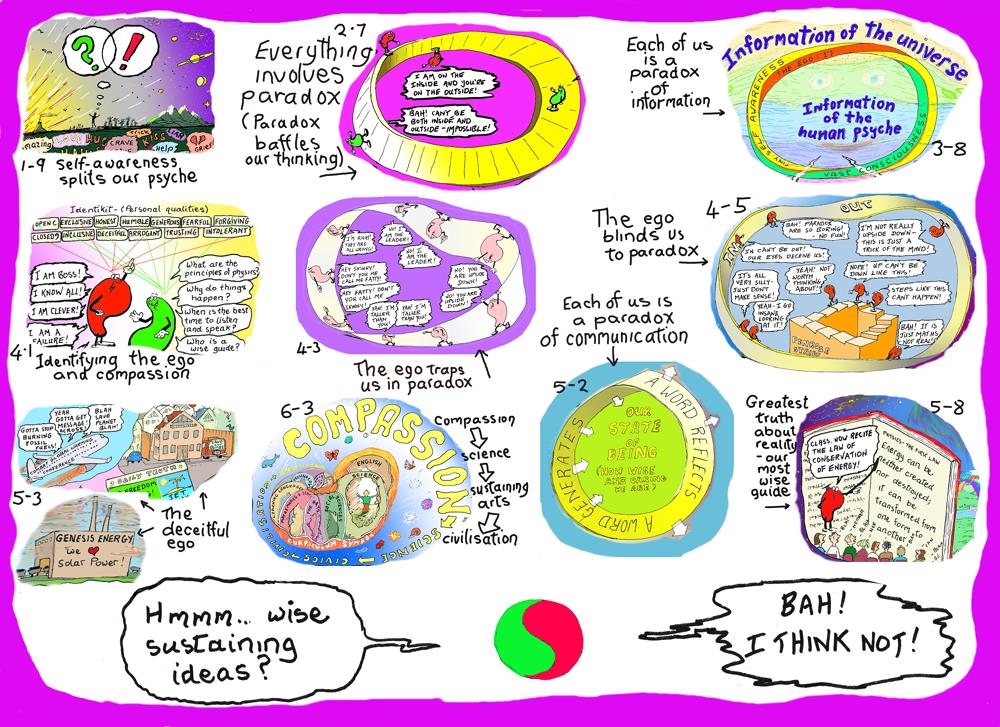
⇓ Two
You know, when I was a boy there was no such thing as an Environmental Educator or Environment reporters or a Ministry for the Environment. No one talked about “The Environment”.
Also there were no plastic bags or plastic bottles. We wrapped food like loaves of bread with paper. We used a glass bottle hundreds of times till it broke.
We did not imagine ourselves traveling in planes and instead traveled overseas by ships.
Things like electric jugs, toasters, vacuum cleaners, washing machines etc and clothes were repaired, not trashed, if a part failed.
8 out of 10 children in our towns and cities walked or biked to school whereas now 8 out of 10 children travel by car or bus.
The word “environment” meant much, much more then – it could even mean the stars, the universe…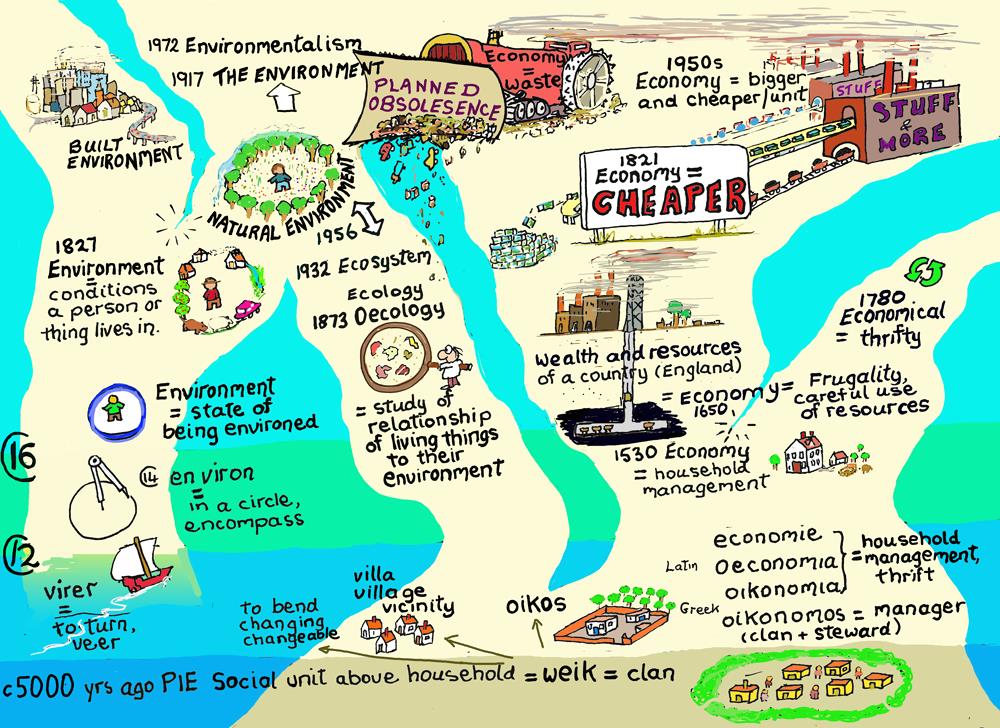
⇓ Three
Confusing? Confused? Two things seem clear: these two words mean a lot to us adults and we give each word very different meanings. They are constantly in the headlines – on TV, radio, the Internet, billboards, magazines, even in your classrooms.
“You must Save the Environment!”
“The Economy is Booming!”
“The Environment is Collapsing!”
“Vote XYZ for a Strong Economy!”
“The Economy is Choking!”
“Join The Great Debate: The Economy v The Environment!”
Maybe you just hear all the adult chatter about “The Economy” and ”The Environment” as background noise – it simply sort of washes over you?
Maybe you dismiss it as the “usual, old, weird adult stuff”?
Weird? Well, recall our letter Fun with Paradox that discussed the idea that everything involves paradox? Maybe the physics of paradox can help us understand this behaviour better… 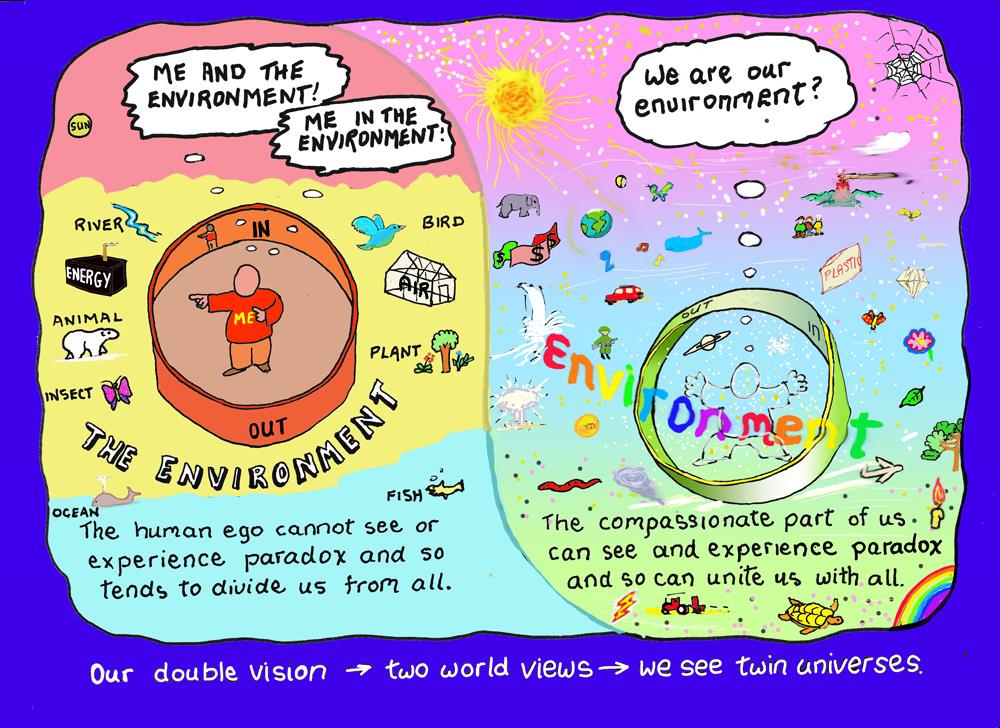
⇓ Four
Perhaps there are also other ways physics can help us better understand the “weird” behaviour of us adults.
Grab a chair and we will try to make sense of “Newton’s Third Law of Motion”.
This physics involves more fun with paradox and so words are pretty useless:
A force occurs when two things interact. Newton was trying to express the general principle that actually a pair of equal and opposite forces occur when two things interact, e.g. your bum and a chair.
Sit very still on your chair for a minute.
Feel the downwards sensation of gravity pulling you towards the ground.
Then feel the upwards push of the chair on your bum. It might take a moment to feel it.
Now try feeling both these opposing sensations at the same time. No go? Does your mind just flit between the up and the down sensation? It is very hard to imagine two equal and opposing forces are the same force. However we experience and trust such paradox all the time…
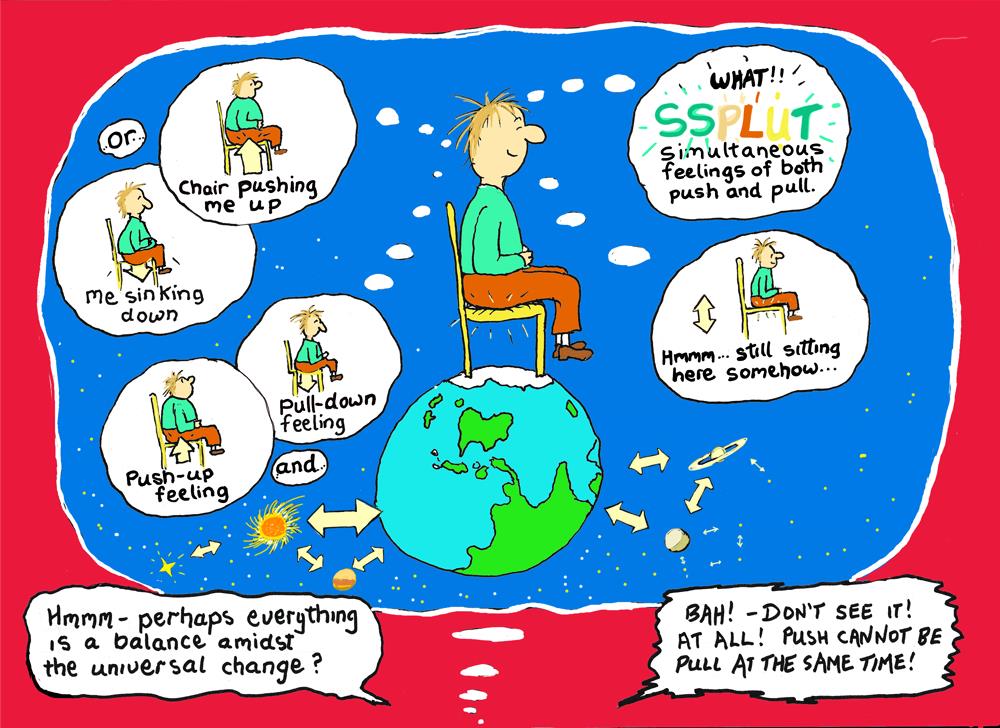
⇓Five
“Newton’s Third Law of Motion” does usefully predict the behaviour of things like chairs and tables and the planets and stars. The principle seems true of things in general and us adults have a very funny attitude to it. For instance, each day we see the sun and the moon rise, the clouds float by, the rain fall and people sitting on chairs. We know from the changing ocean tides and seasons etc that there are real, vast and invisible networks of interactions going on. “That’s the laws of physics in operation,” we say.
However there is a part of us adults that insists, “Nope. Thoughts and words aren’t real or physical or material things like the rest of the universe. Nope, my thoughts are spiritual. They are non-physical, mental constructions that exist way above and beyond the principles of physics.”
Maybe you can by now guess what that part of us is called?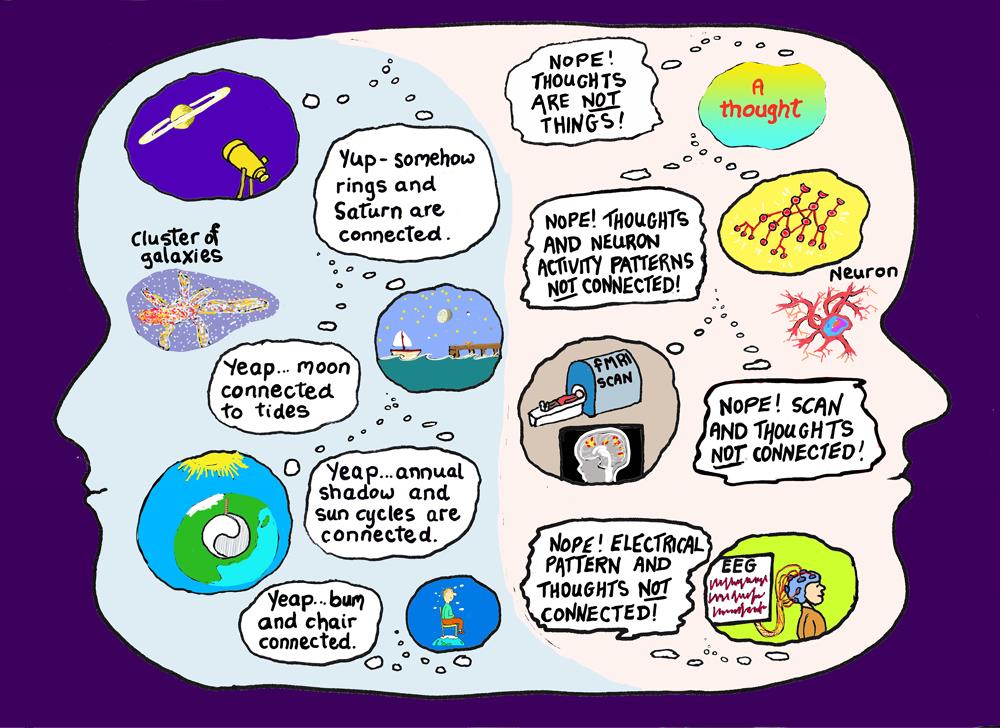
⇓ Six
Remember how we had a bit of a play with an Identikit of the human psyche? What do you reckon? Perhaps the belief that thoughts and words are not things like everything else is actually another ingenious trick of the ego?
The belief that thoughts aren’t physical is common in our society.
It’s a favourite belief of many of our cleverest poets, teachers, politicians, advertising experts, self-styled “scientists” and merchants. Each person offers a different and very sophisticated reason why thoughts cannot be matter like stones and stars, bones and buildings and all other things.
At the same time some of these people pay squillions of money to own and use a word. Some even fight to death because of a word.
Its funny enough that adults can act quite the opposite to their belief. Its even more funny that the very cleverest adults can be the most blind to their own “weird” behaviour.
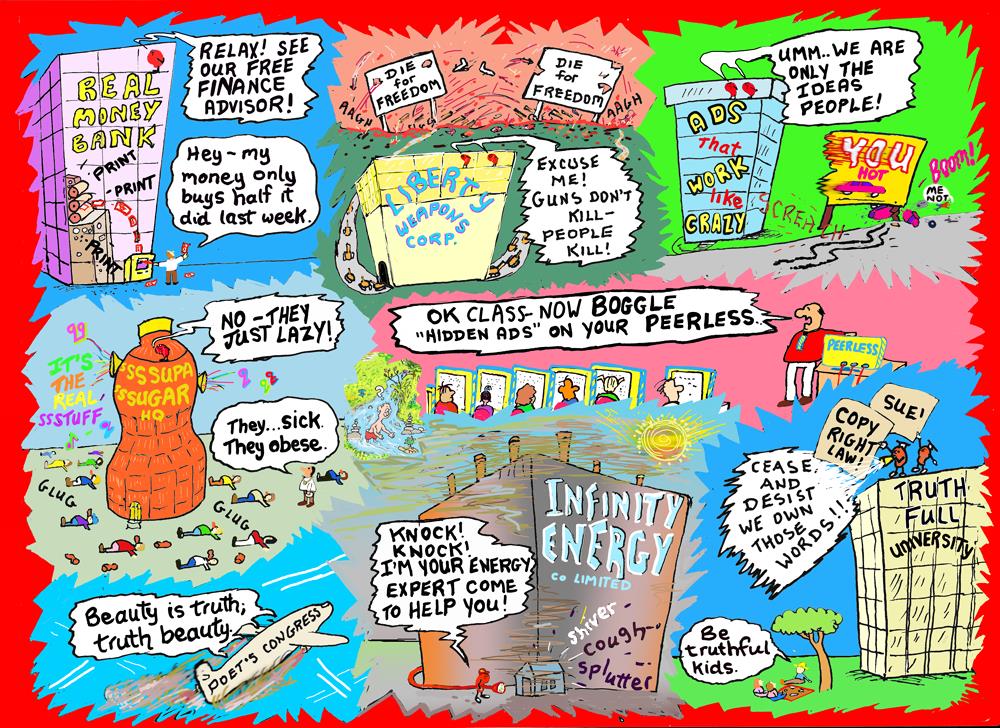
⇓ Seven
Phew. Cartoon No 6 sure is a crowded picture and these tricks of the ego are just a tiny sample of the self-deceits we adults are capable of. What do you feel? A bit crazy? Scary? Weird? Rather funny? Mind-boggling? Words fail me. However what if everything in the universe really does involve paradox? Then this “weird” behaviour of us adults involves physics that we can sense and experience but cannot think about.
So perhaps let’s just sit still for a minute and feel the atoms of our bum interacting with the atoms of the seat of our chair.
Can you sense the atoms informing each other? Can you feel the pressure? We are able to sit still because the atoms have forms a balanced arrangement with each other so we are neither pulled to the floor or pushed up to the ceiling.
Sit long enough and the force can make our bum feel quite sore. Stand up and the invisible force stops though the dents in our legs and the seat are a reminder that it actually involved two simultaneous equal and opposite forces. Yes, welcome to our wonderful paradoxical universe of forces…
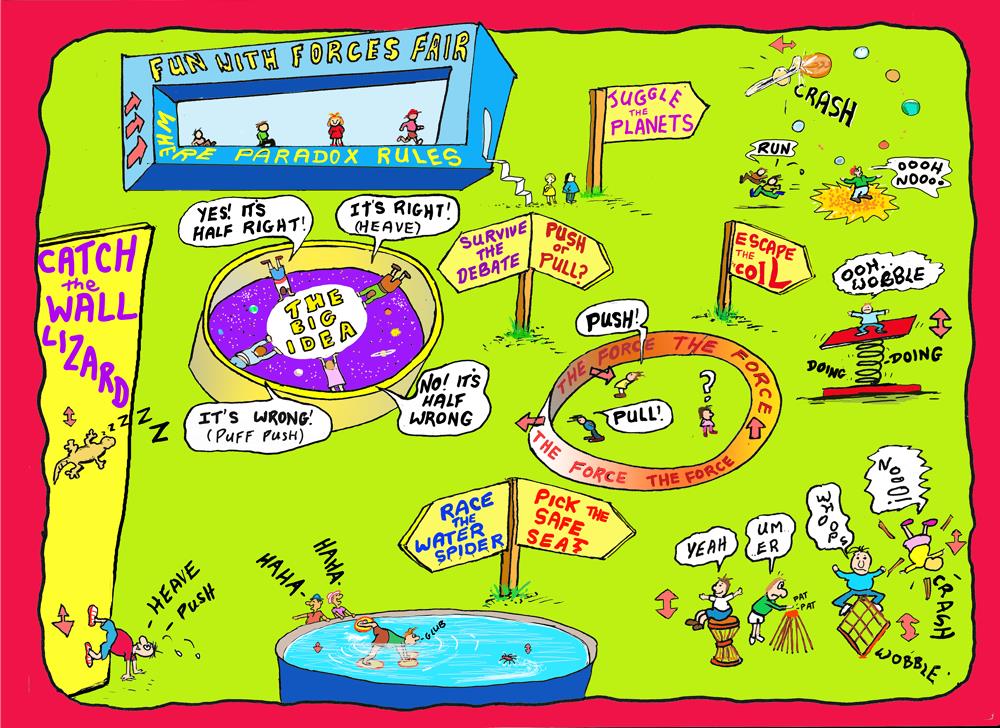
⇓Eight
Maybe you are asking “What is the Big Idea?” Well, I don’t know. Who can be sure what the “Big Idea” is if every thing in the universe involves unthinkable paradox.
Paradox means every little idea is also somehow a huge idea. This is mind-boggling to think about.
Perhaps it’s more helpful for us to just be mindful that ideas and thoughts are forces like everything else is. This means they too obey the rules governing how the universe acts, even if they are also invisible like the wind that moves the clouds and the heat of the sun that warms us.
It could be heaps of fun to use the principles of physics to explore our history and the “weird” behaviour of us adults at various times.
As we have seen in the cartoons, a huge shift occurred in our English culture this past three centuries. They show our use of the English language completely changed as some of us began burning just about anything on Earth we could set fire to. Some people objected to the associated pollution and misery. Soon various schools of thought sprang up as people argued about the meaning of life and this led to a whole lot of pushing and shoving of “Big Ideas”…
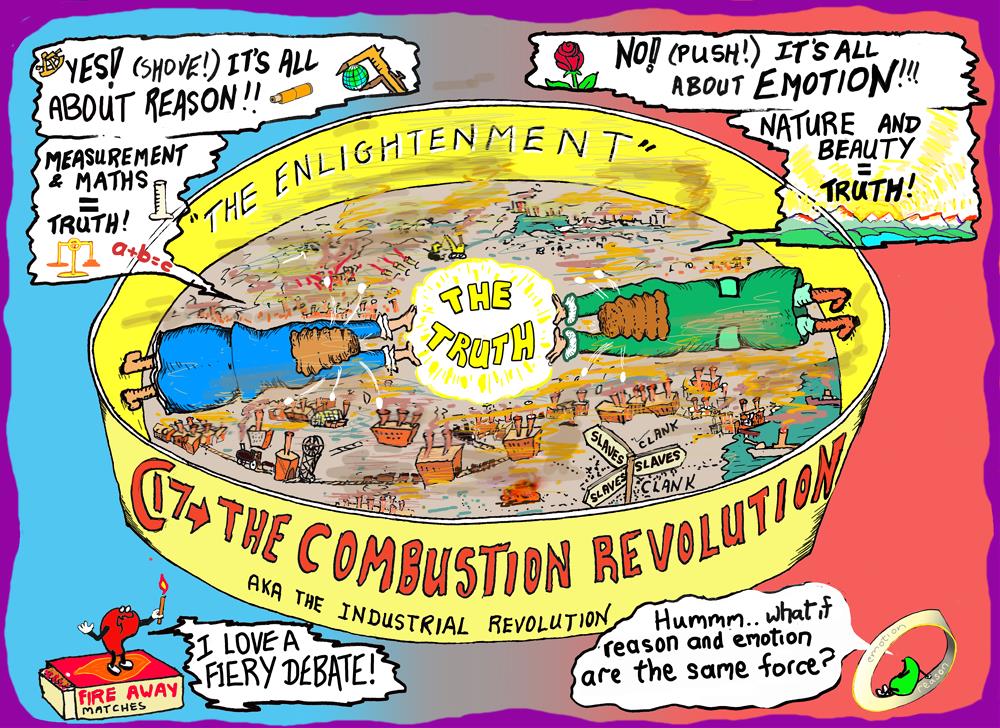
⇓Nine
The above cartoon of life in England two centuries ago illustrates how the ego can so easily have us adults trap ourselves in some pretty hopeless situation.
One group – the Rationalists – pushed their belief we can think our way out of our problems.
Another group – the Romantics – deny this. They shoved the belief that our emotions provide the solutions to our woes.
Push. Shove. The two groups became so tied up pushing and shoving each other that they combined to form a new force – a force that worsened the pollution and misery caused by England’s Combustion Revolution.
It seems little has changed in our modern English culture since then. The main difference is our use of English and our pollution is much worse. Our language may have changed a lot but the same two groups of us adults remain locked in the same hopeless tussle with each other.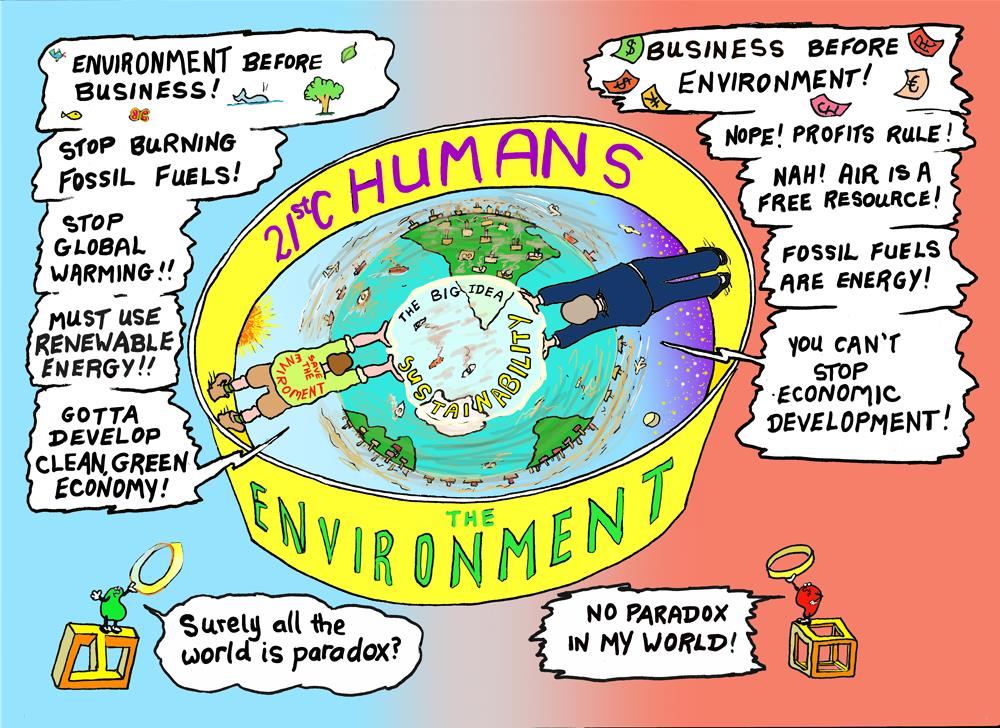
⇓ Ten
So back to your question: “Are Environmental Educators good?”
Maybe a better question is: “Are Environmental Educators basically adult human beings like the rest of us?”
If so, they also enjoy some compassion and they also confused by the ego like the rest of us. (We have discussed how The Trickster Ego can easily make the best of us our own worst enemy.)
They too get trapped in paradox and end up communicating completely different messages to what they think they are saying. This confusion means they can easily become the cause rather than the solution of problems.
Does this mean they are bad? Or careless? Or hypocrites? Or trouble-makers? Or could it be that people who call themselves “Environmental Educators” simply fail to grasp the basic principles of physics and this failure means their lifestyle and language becomes unsustainable in some way?
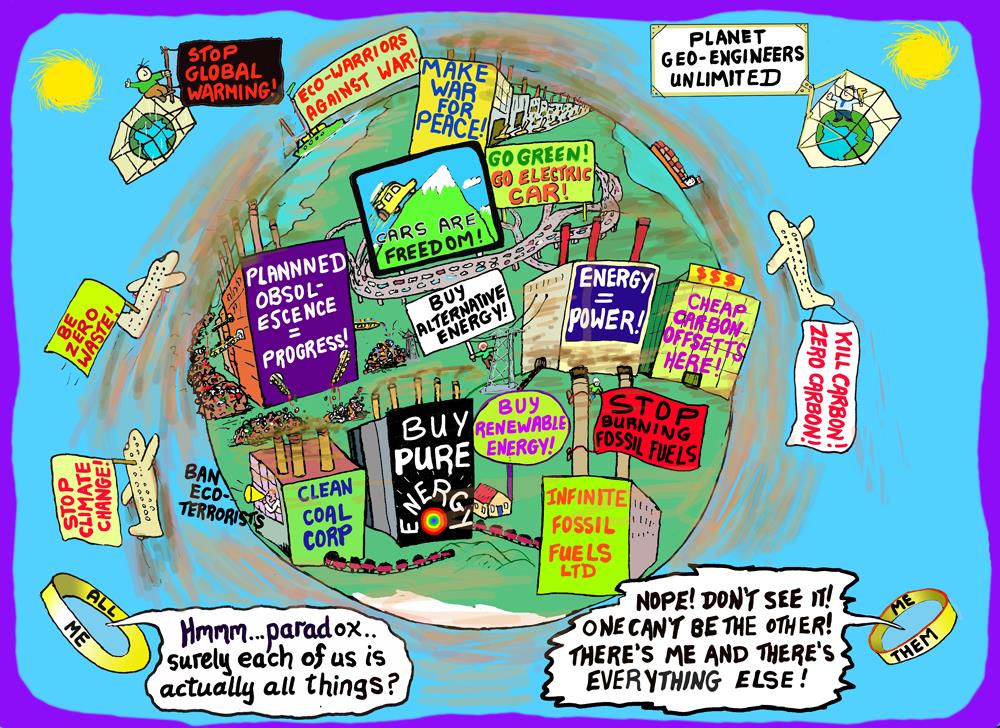
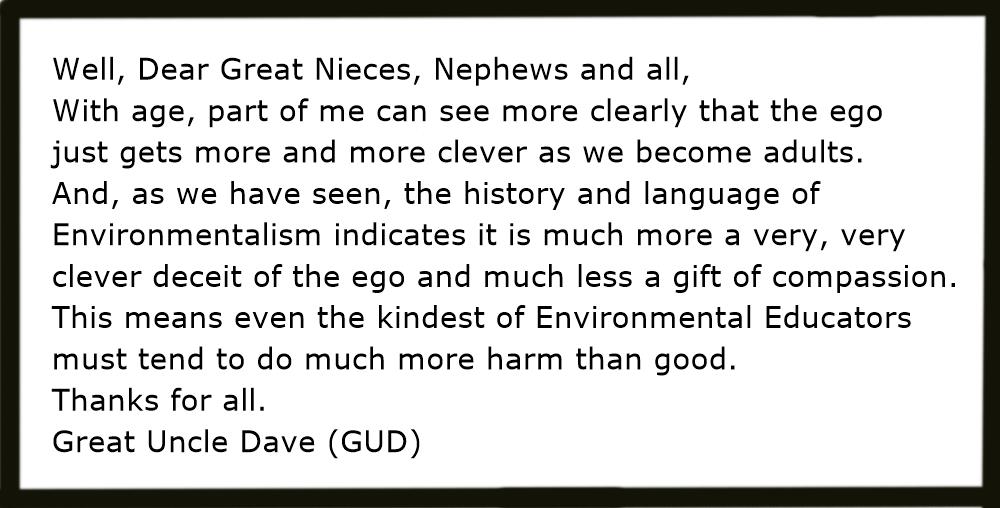
Previous -Dear GUD Letter 6 Compassionate Education
Next – Dear GUD Letter 8 Hope and Energy
First draft completed Sept 29 2018
